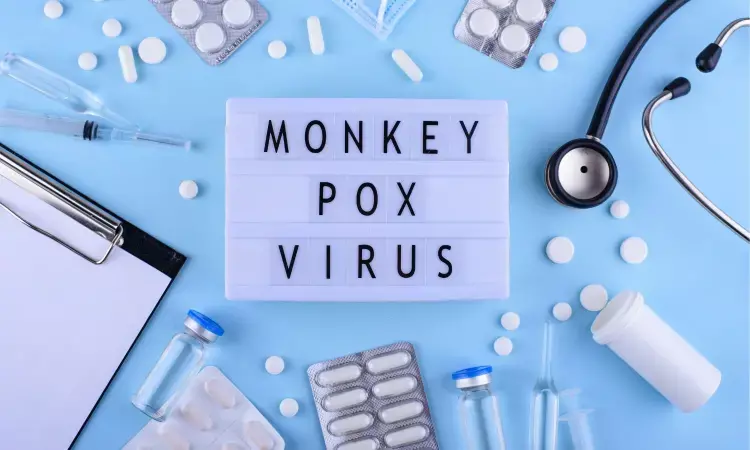- Home
- Medical news & Guidelines
- Anesthesiology
- Cardiology and CTVS
- Critical Care
- Dentistry
- Dermatology
- Diabetes and Endocrinology
- ENT
- Gastroenterology
- Medicine
- Nephrology
- Neurology
- Obstretics-Gynaecology
- Oncology
- Ophthalmology
- Orthopaedics
- Pediatrics-Neonatology
- Psychiatry
- Pulmonology
- Radiology
- Surgery
- Urology
- Laboratory Medicine
- Diet
- Nursing
- Paramedical
- Physiotherapy
- Health news
- Fact Check
- Bone Health Fact Check
- Brain Health Fact Check
- Cancer Related Fact Check
- Child Care Fact Check
- Dental and oral health fact check
- Diabetes and metabolic health fact check
- Diet and Nutrition Fact Check
- Eye and ENT Care Fact Check
- Fitness fact check
- Gut health fact check
- Heart health fact check
- Kidney health fact check
- Medical education fact check
- Men's health fact check
- Respiratory fact check
- Skin and hair care fact check
- Vaccine and Immunization fact check
- Women's health fact check
- AYUSH
- State News
- Andaman and Nicobar Islands
- Andhra Pradesh
- Arunachal Pradesh
- Assam
- Bihar
- Chandigarh
- Chattisgarh
- Dadra and Nagar Haveli
- Daman and Diu
- Delhi
- Goa
- Gujarat
- Haryana
- Himachal Pradesh
- Jammu & Kashmir
- Jharkhand
- Karnataka
- Kerala
- Ladakh
- Lakshadweep
- Madhya Pradesh
- Maharashtra
- Manipur
- Meghalaya
- Mizoram
- Nagaland
- Odisha
- Puducherry
- Punjab
- Rajasthan
- Sikkim
- Tamil Nadu
- Telangana
- Tripura
- Uttar Pradesh
- Uttrakhand
- West Bengal
- Medical Education
- Industry
Tecovirimat safe to use in patients infected with monkeypox

Tecovirimat (Tpoxx) was well tolerated by individuals who had the monkeypox viral infection, says an article published in Centers for Disease Control and Prevention.
Tobolowsky and colleagues recruited 549 patients for this trial, of whom 99.8% received oral tecovirimat treatment. There were 97.7% men and a median age of 36.5 and detailed information was provided for 369 patients. Of the 464 patients who provided information about their race and ethnicity, 38.8% identified as white, 34.7% as Hispanic or Latino, and 17.9% as Black or African American. Lesions affected less than 10% of the bodies of around two-thirds of patients, and 75% to 100% of the bodies of 4.7% of patients, respectively. After the beginning of symptoms, patients received their first dosage of tecovirimat on average 7 days later (interquartile range, 5-10).
The key findings were:
1. Among over 300 patients taking tecovirimat under the FDA-regulated Expanded Access Investigational New Drug (EA-IND) protocol, 6.9% were hospitalized after symptom onset, with a median duration of hospitalization of 4 days.
2. Of 255 patients with available data, the median time to subjective improvement after starting treatment was 3 days, with no differences noted between patients with HIV positivity and those with no information on HIV status. Furthermore, among 317 patients with available outcome data, 72.6% recovered with or without sequelae, while 27.4% were reported to be not yet recovered, though 78 had not yet completed the standard 14-day tecovirimat treatment course.
3. 13.1% of patients with data reported developing new lesions within the first week of therapy, whereas 31.8% said all lesions crusted over and cured.
4. 13.5% of patients said they developed new lesions in the second week, while 49.7% said the lesions crusted over and healed.
5. Following therapy, 2.2% reported developing new lesions, whereas 89.5% reported healed lesions with a fresh layer of skin under the scab.
6. 3.5% of the 340 participants experienced negative side effects, which included headache, nausea, vision impairment, weakness, and psychiatric hospitalization.
In conclusion, these results suggest continuing access to tecovirimat therapy during the present monkeypox outbreak because the drug is typically well tolerated.
Reference:
O'Laughlin, K., Tobolowsky, F. A., Elmor, R., Overton, R., O'Connor, S. M., Damon, I. K., Petersen, B. W., Rao, A. K., Yu, P., Yu, Y., Campbell, C., … Cheng, M. (2022). Clinical Use of Tecovirimat (Tpoxx) for Treatment of Monkeypox Under an Investigational New Drug Protocol-United States, May–August 2022. In MMWR. Morbidity and Mortality Weekly Report (Vol. 71, Issue 37). Centers for Disease Control MMWR Office.https://doi.org/10.15585/mmwr.mm7137e1
Neuroscience Masters graduate
Jacinthlyn Sylvia, a Neuroscience Master's graduate from Chennai has worked extensively in deciphering the neurobiology of cognition and motor control in aging. She also has spread-out exposure to Neurosurgery from her Bachelor’s. She is currently involved in active Neuro-Oncology research. She is an upcoming neuroscientist with a fiery passion for writing. Her news cover at Medical Dialogues feature recent discoveries and updates from the healthcare and biomedical research fields. She can be reached at editorial@medicaldialogues.in
Dr Kamal Kant Kohli-MBBS, DTCD- a chest specialist with more than 30 years of practice and a flair for writing clinical articles, Dr Kamal Kant Kohli joined Medical Dialogues as a Chief Editor of Medical News. Besides writing articles, as an editor, he proofreads and verifies all the medical content published on Medical Dialogues including those coming from journals, studies,medical conferences,guidelines etc. Email: drkohli@medicaldialogues.in. Contact no. 011-43720751


